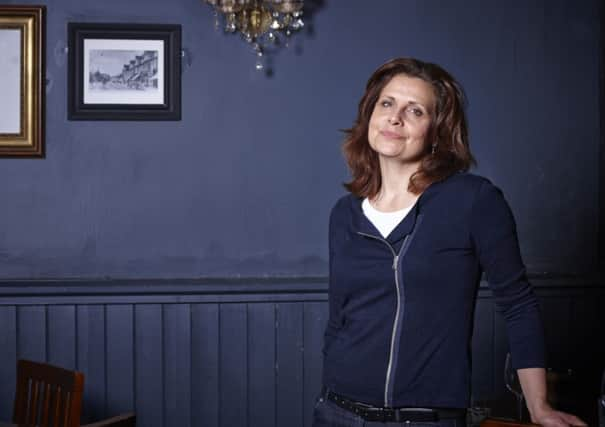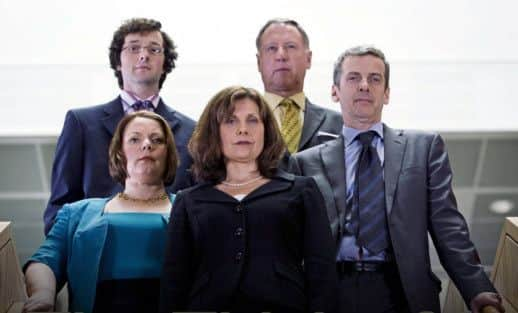Actress Rebecca Front on her new memoir


She has a thirst for knowledge and acute powers of observation that have enabled her to fill her book, Curious: True Stories and Loose Connections, with entertaining anecdotes and commentary from childhood to the present day, exploring what she calls “the awkwardness of human interaction, the unshakeability of fear, the randomness of memories.”
For her own part, Front, 50, has no problem with being described as odd. “Being curious was my starting point, in both the active sense – being interested in people and things; and the passive – being, as we all are, a bit odd.”
Advertisement
Hide AdAdvertisement
Hide AdBest known as Nicola Murray MP in The Thick of It, Kevin Whately’s boss in Lewis and for Nighty Night on TV, she also writes and stars with her brother Jeremy in BBC Radio 4’s Incredible Women, and has been penning newspaper columns and comment pieces for many years. It’s a logical extension that she would write a book of stories, all of them ostensibly true, but as she says, “a little out of shape in the telling”, from her life and award-winning acting career.


“I have written a lot over the years, columns mainly, and honestly never had any intention of writing this book. With hindsight it was because I didn’t think I could, but I realised I could when I started. OK, some people will hate it and there’s nowhere to hide, but now I think why not? I had changed agents and they were keen on me doing it, so I wrote a sample chapter, and once I’d started it I liked the format. I like David Sedaris, Clive James, Nora Ephron and Jan Struther, who wrote Mrs Miniver. Tiny aspects of life that have a bigger resonance, that’s my territory. As an actress I always start with the tiny things too,” she says.
A brilliant storyteller, it’s the curious in the quotidian that attracts her gaze as she spins her funny and poignant tales. There’s the house guest who refused to leave and her parents who are too polite to make him, her prolonged refusal to go to school, and why she didn’t start a fight when Lauren Bacall stole one of her husband’s chips.
From the Curious of the title and cover photo of Front peeping through a tiny door at a white rabbit, there’s a constant Alice in Wonderland theme at work.
“I really associated with Alice and was fascinated by Lewis Carroll imagery and it seemed to me that a lot of my preoccupations kept coming back to me as Alice images: her falling down the rabbit hole and not able to get out, stuck in a pool of tears, stuck in the tiny white rabbit’s house, my fear of drowning, insecurity and claustrophobia. That image is a really strong one for a claustrophobic. Also, the word ‘curious’ is in every chapter,” she says.


It was a trip to Durham Cathedral that sparked Front’s claustrophobia at the age of eight when her family became stuck in a people jam on the way up the tower. After that it was medieval spiral staircases that sparked the fear, which could be worked around, but then the tube, trains, lifts and aeroplanes, which couldn’t.
“I’m phobic about small spaces. You hate the feeling and don’t understand what it is. Then you avoid it. You think I won’t do this and this and I won’t have that feeling anymore. But if you leave it unchecked it can turn into a serious problem. You have to address it, either with someone professionally, or through your own good offices and do your own thing.”
If Front was ever to leave the house, live a family life and pursue a career, something had to be done. For her, cognitive behaviour therapy was the answer.
Advertisement
Hide AdAdvertisement
Hide Ad“Every couple of years I have to do it and having sessions will be an ongoing thing for me. It’s surprising what you can do when you really have to. I have always been quite confident and then every now and then would go into pockets of fear. There’s a thick seam of fear in me. I used a lift the other day for the first time in a long time. I was weak and frightened, then five minutes later I was on the phone discussing a job, completely confident again.”
If the claustrophobia is ongoing, Front faced down her swimming and school phobias in childhood. The origins of these were linked to a holiday when she was 11 and her father almost drowned in a river. Two days later her grandfather died, leading her to conclude: “Death had it in for my family… He was obviously coming after mum.” Given that her mother appeared to the over-anxious young Rebecca to be engaging in reckless activities such as “going in cars, climbing stairs, eating pieces of fruit small enough to choke her”, she vowed to protect her and she couldn’t do this if she was at school. Front’s long-suffering mother, who was a teacher as well as a writer of children’s books, agreed to home school her until a place at a school nearer to their home came up. Then for a spell she sat and wrote in the school library until Rebecca relaxed. After kicking the deputy head on her first day, Front did settle down and ended up becoming head girl.
Oxford followed, where she became the first female chair of the Oxford Review and began performing in plays and sketches. After university she sent an audition tape to the BBC radio drama department, where 11 members of a panel of 12 approved, but her future husband, now a screenwriter, didn’t.
“For the very best of reasons,” she laughs. “He did like the quality of the voice, but his objection was I sounded too posh. I came along with a very strong Oxford English voice and he said we don’t want that. He wanted the BBC to reflect lots of different accents and not traditional BBC English. He wanted Scottish, Welsh and Mancunian, quite rightly.
“Gants Hill where I grew up in North London wasn’t a posh part of town and I hadn’t intentionally lost my accent, but I went to Oxford and lots of people there had gone to posh schools. Then I went to drama school and it was encouraged for you to be able to do standard English. After three years at Oxford I had almost lost every aspect of what Essex accent I had. I did go through a little Lord Fauntleroy thing, but it’s slightly softened again now and I drop aitches.”
Front went on to work with Stewart Lee and Richard Herring on the radio shows Lionel Nimrod’s Inexplicable World and On the Hour, and the TV and radio series Fist of Fun. Next was the TV version of On the Hour, The Day Today, with Chris Morris, Armando Iannucci, Doon Mackichan and Steve Coogan.
“Working with Armando and Doon was a dream job. They were a great team and it pushed me in directions I didn’t think I could go in. Improv. I thought I couldn’t do it but Armando just got me to do it anyway. It upped all of our games,” she says.
Another dream job for Front was The Thick of It, in which she worked with Peter Capaldi as the foul-mouthed Malcolm Tucker.
Advertisement
Hide AdAdvertisement
Hide Ad“Peter was the star. He’s lovely, absolutely not like Malcolm Tucker. People assume he’s going to be terrifying, but he couldn’t be less like that. He’s gentle and unassuming. I loved working with him. I would work with him till the cows came home,” she says.
The Thick of It is also the show that gets her most often recognised in public, especially in the bars around Westminster.
“Women politicians slightly nervously all thought Nicola was meant to be them and the male ones thought it was based on a colleague. They would start off being very friendly and chatty and saying is it me? It never was. Ken Livingstone said it was too aggressive and painted a bleaker picture than was true, but others have said it was accurate. I had a female ex-MP coming up to me saying, you don’t know the half of it,” she says.
“Nicola Murray is probably the closest of any of the characters to me although she’s not me. She’s the one I drew most freely from myself, because the way I learned to work with Armando, you have to draw on a particular aspect of yourself,” she says.
This came in handy when she was playing Nicola Murray having a panic attack on a train in an episode of the show and it became a case of art imitating life.
“The writers knew I was claustrophobic but didn’t know I had a problem with trains. Until we did it, I hadn’t been on a train for four years. There is a point in rehearsal when you mention it and I thought I should tell them but I just didn’t and decided to do it. I needed to do it. I had no choice but to channel the claustrophobia and use it. I was having to walk up and down the train hyperventilating, playing Nicola having a panic attack, while I was warding off the claustrophobia,” she says.
Fear and courage are two sides of the same coin and can perhaps be traced back to Front’s endearing family, who leap from the pages of her book. From no-nonsense, don’t make a fuss, just get on with it East End backgrounds, they tempered family life with a 1960s liberalism and humanity and Front credits them with her transformation from a child too terrified to go to school, to a young woman who became head girl and went on to Oxford to study English literature.
Front’s parents were reformed Jews who leant more towards vegetarianism than religious observance and enjoyed family debates and singalongs. Front describes them as “like the von Trapps, only fewer in number and more Semitic”.
Advertisement
Hide AdAdvertisement
Hide Ad“It was very much a model my husband and I wanted to base our own on. He said you are so close and reinforce each other, still are. My brother and I work together and adore each other’s company.”
Front’s father was an artist who designed the iconic lettering for the Beatles’ Rubber Soul album, a graphic style that almost personified the Sixties.
“We were always immensely proud of the fact he had met the Beatles but I didn’t realise until later what an iconic piece of design that was.”
If her parents were liberal, grandmother Dolly was more of an archetypical Jewish matriarch, who viewed a world she knew was out to get her through eyes “narrowed by a combination of myopia and cynicism”. The daughter of Eastern European immigrants, she was often unintentionally funny, marching up to young men in the street and buttoning up their coats against the cold. Thus it wasn’t much of a stretch for Front to play the overbearing Jewish mother in Simon Amstell’s Grandma’s House.
“My son watches that with his hands over his face. It was familiar to me, because Simon Amstell grew up in the same part of London, in fact the same street for a time, although our families were different.”
As Front admits, not only does memory play tricks, but writing about friends and family can be tricky territory.
“I have disguised identities as much as possible because when something happened 25 years ago you remember it vaguely. So if there were any questions in my mind about whether people would see it the same way or be displeased, or whether a fact might make them feel uncomfortable in later life, then I changed identities. In fact I have treated them as if they are fictional characters, but these things are real and happened.
“I didn’t want it to be a mean-spirited book at all because that’s not my view of the world and I wanted people to be comfortable with it. The last thing on earth I would want this book to be is a misery memoir.”
Advertisement
Hide AdAdvertisement
Hide AdFront is planning another book, along the same format, perhaps with more appearances from the hilarious Dolly, as well as filming another series of Lewis this month. She’ll be at the Edinburgh International Book Festival promoting the book, and she’d also like to do more theatre, “something serious. Or a musical. One extreme or the other.
“I’m pleased with my life,” she says. “I’m really happy because I have a happy marriage and two amazing kids and earn a living doing something I love doing. I would have no right not to feel pleased with the way things are going.
“Most people don’t give me a second glance and if they do it’s because they like one programme and have watched it several times and that’s nice. But I don’t have any desire to be a celeb. Why would you?”
• Curious: True Stories and Loose Connections is out now, published by Weidenfeld & Nicolson, priced £16.99 hardback, £8.99 eBook